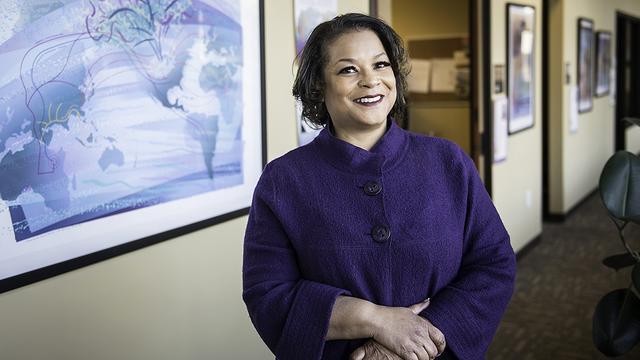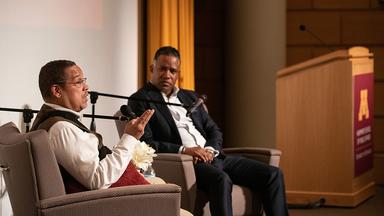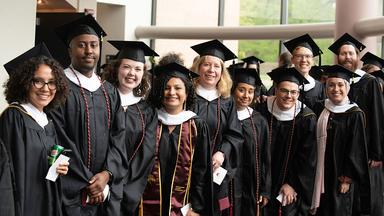of UROC. Photo: Bruce Silcox
Interview by Carmen Peota
For the second time on a September afternoon, the people gathered for the annual Community Day program at the Robert J. Jones Urban Research and Outreach-Engagement Center (UROC) are on their feet clapping for Makeda Zulu-Gillespie (MPA ’18), the new executive director of the organization that links North Minneapolis with University of Minnesota researchers and resources. Adair Mosley, president of nearby Pillsbury United Communities, seems to speak for all in the auditorium when he says to them, “I’m ecstatic about this choice.”
Clearly, many in this crowd of 300 know and love Zulu-Gillespie. Except for a brief detour into the corporate world, she has always worked in, on, and for North Minneapolis. She came back to the neighborhood after earning her bachelor's degree at Grambling State University in Louisiana.
She’s run programs for the YMCA, served on boards for local arts and service organizations, directed a nonprofit that promotes academic achievement, and organized for the Northside Residents Redevelopment Council. She knows the area, the issues, the people. Moreover, she knows UROC. She’s worked for the organization since its inception.
Zulu-Gillespie says the ovations were “overwhelming and affirming,” given her long association with UROC. We asked about her journey to this position and her hopes as she shepherds UROC into its second decade.
How did the North Minneapolis community shape you?
I grew up two blocks away and spent most of my time going to activities at youth centers. The opportunities I had were unlimited. We were made to feel like we were the center of the universe. We went to Dayton Hudson and walked the runway. I thought I was a superstar model—I’m 5-foot 3. I sang in a choir, marched in a drum corps, and learned ballet. I felt I was important—in a very good way. That experience taught me that community is family. What I didn’t learn until I was about 30 is that you can’t just benefit from community, you need to give back.
What do you say to people who focus on its negatives?
People who say bad things don’t live here. We’ve got tough stuff. But when you go to other cities, you realize that our problems—crime, for example—are not as big as those in other cities. We have a cold and they’ve got pneumonia. And people in the community are making positive change in response to personal challenge.
How did you come to work at UROC?
I was working as a community organizer when I heard that the U was thinking about coming to North Minneapolis. My role was to get people together to hear what was being proposed. The meetings were full of tension. The community was upset that the University had closed the General College [a gateway to the University for under-prepared high school students, many of whom were immigrants and people of color]. They had seen Extension programs come and go. They didn’t want to be guinea pigs for researchers. And they were concerned the U wouldn’t hire people from the community.
When they opened up the community liaison position, I said, “I’m not going to work at the bad University.” But then, someone said to me, “You could be the inside person. You could look out for the community from inside the U.”
How do you describe what UROC does?
We are a connector and a convener. We don’t push people. We pull people together.
What prompted you to apply for the executive director position?
The past executive directors were tenured faculty, so at first I didn’t think about applying for the job. In a conversation, I shared that I thought UROC needed someone who could connect with people, who understood engagement, who could make sure it was more than transactional, that it must always be a mutually beneficial process. I felt I was that kind of person. In that conversation, I realized I wanted to lead UROC.
How did studying at the Humphrey School prepare you for this work?
I learned my geographic community faced oppression and divestment like communities around the world, and had people fighting for the common good. The Humphrey School affirmed my core values, way of being, and gave me tools and time to practice new skills with people who didn’t always think the same way.
What are your hopes as you begin to lead this organization?
I want to honor the leadership that’s gone before by continuing strains of that. They helped get us to this good place. I hope that the community that I grew up in will be proud of the work that we do while I’m here. I hope that the University will be proud and that somehow we’ll bring back to the young people in this community the idea that the University of Minnesota, and education in general, can be part of their future.
Carmen Peota is a freelance writer and editor in Minneapolis.


